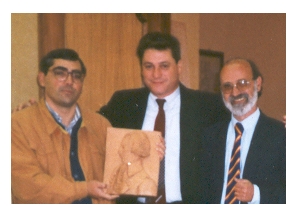 programme
on the thought of Alessandro Malaspina. To
mark the occasion, Dr. Galera donated a number of years of the magazines
Asclepio
and Revista de Indias to the Centro's library.
programme
on the thought of Alessandro Malaspina. To
mark the occasion, Dr. Galera donated a number of years of the magazines
Asclepio
and Revista de Indias to the Centro's library.
"ALESSANDRO MALASPINA"
Mulazzo, Massa-Carrara, Italia
NEWSLETTER OF THE CENTRO
Year 2, no. 7 May 22/2001
Edited by Dario Manfredi and Rossana Piccioli,
translated by John Black
NEWS
1. Visits to the Centro
1.1. Dr. Andrés Galera Gómez of the Consejo Superior Investigaciones
Científicas (History of Science Department) in Madrid spent two
days studying at Mulazzo. During the visit, he explored with
the management of the Centro the possibility of developing a joint research 
Dr. Andrés Galera receives the "Malaspina Tile" from Prof. Roberto Malaspina, Mayor of Mulazzo, and the director of the Centro di Studi Malaspiniani.
1.2. Class 2C of the "Enrico Fermi" middle school in Langhirano (Parma)
visited the Centro di Studi Malaspiniani as part of some historical research
directed towards the study of the
scientific expeditions of the 18th century. The students, at the timely
suggestion of their teachers, expressed a desire to remain in contact with
the Centro by Internet, for the purpose of staying up-to-date on studies
regarding the Navigator. We hope that this example is followed by
other educational institutions.
PUBLISHING NOTES, ANNOUNCEMENTS AND COMMENTS
MONGE, Fernando, "Mamalni e indios en Nootka. Apuntes para un escenario," Revista de Indias, LIX (1999), nO. 218, pp. 499-598.
This paper discusses the circumstances of the Nuu-chah-nulth people with reference to the visit of the Malaspina Expedition..
In Lima, Volume 8 (2000) of the periodical Derroteros de la Mer del Sur has just been released. Besides the usual collection of news, book reviews and Ibero-American maritime and naval bibliographies, it contains the followings articles:
BAERT, A., "Don Diego de Prado y Tovar dans la mer du Sud";
DERMIT, P., "Ortuño Jiménez de Bertendona, un caso de
sinonimia en el Mar del Sur en
tiempos de Hernán Cortés";
GOMEZ DUARTE, F. "El corso insurgente a través del Diario Marítimo Gaditano, 1817-1828";
LOPEZ URRUTIA, C., "The Chilean Naval Mutiny of 1931";
MANFREDI, D., "Adam J. Krusenstern y la primera
edición del viaje de Malaspina. San
Petersburgo (1824-1827)";
MAURO, F., "Pour une histoire des occasions manquées la France
et le Bresil, 1500-1700" and "Breves apuntes sobre la Historia de la Marina
de Guerra del Perú."
PUBLICATIONS RECEIVED
SOTO ARANGO, Diana, Francisco Antonio Zea. Un criollo ilustrado, Aranjuez, Doce Calles, 2000. 326 pp.
An interesting study of the botanist and Colombian politician who suffered persecution, and was incarcerated in Cádiz at the same time as Alexandro Malaspina was in La Coruña.
SERAFINI, Flavio, Musei navali nel Mondo, Turin, Paravia, 1997, 432 pp.
This richly illustrated volume contains the catalogues of over seven
hundred naval museums. The Museo
Naval di Madrid is also mentioned as containing the heirlooms of Alexandro
Malaspina.
OUR ARCHIVES
Dr. Valerio Bernardi – who has for many years followed and assisted in the activity of the Centro di Studi Malaspiniani – has discovered, acquired and donated to the Centro a document concerning Luigi Malaspina of Mulazzo. It consists of a petition put together by Count Giuseppe Ravenna in 1814 and sent to Luigi Malaspina, who at that time held the position of President of the Provisional Regency of the Imperial Fiefdom of Lunigiana. The document has a certain historical importance, in as much as it casts some light on the public activity of Luigi, of which practically nothing was known. The Provisional Regency (founded when Napoleon was sent to the island of Elba) operated probably for only few months, since the Congress of Vienna completely abolished the Imperial fiefdoms and united each of those territories with the Duchies of Parma or Modena.